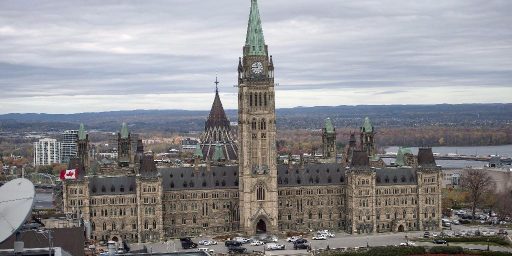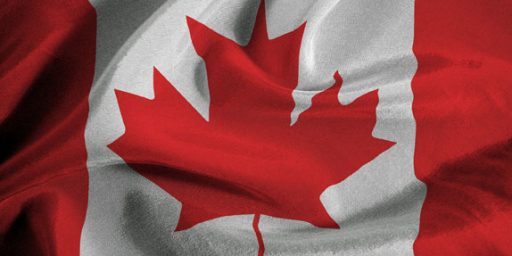U.S.-Canadian Relations Off to Icy Start
Canada’s new conservative prime minister, expected to improve relations with the United States, started off on an acrimonious note, escalating a fight over the Northern Passage.
Stephen Harper, elected Monday as prime minister, warned the United States on Thursday to back off from its challenge of Canadian sovereignty in Arctic waters that are fast thawing from global warming. In the first news conference since his election, Harper upbraided the U.S. ambassador for asserting that the icy polar regions, including the legendary Northwest Passage, are international waters.
Canada claims that its archipelago of some 16,000 islands makes that region Canadian territory. “The United States defends its sovereignty. The Canadian government will defend our sovereignty,” Harper said. “It’s the Canadian people we get our mandate from, not the ambassador of the United States.”
The two countries — as well as Russia — have had conflicting claims in the Arctic for at least three decades. Harper’s Conservative Party has proposed expanding Canada’s military presence, building new icebreakers and creating an early warning system to detect other ships, all to enforce its claim of sovereignty.
[…]
David Wilkins, the U.S. ambassador to Canada, was quoted Wednesday at a discussion in Ontario as saying, “We don’t recognize Canada’s claims to those waters.”
The law of the sea is very complicated when it comes to these claims. The generally-recognized limit of national sovereignty is 12 miles from one’s borders. How to deal with ancillary territories like archipelagos, however, has never been satisfactorily settled.
Update: An extended discussion of the law of the sea as it applies to archipelogoes is both beyond my expertise and boring beyond words. That said, some quick research reveals the complicated nature of the matter.
This is excerpted from a 1995 speech by Ambassador David A. Colson, Deputy Assistant Secretary for Oceans, U.S. Department of State (I’ll bet you didn’t know such an office existed. I didn’t.)
Within specified archipelagic baselines (which can not exceed certain technical parameters), an archipelagic State can claim sovereignty over the waters, the air space and to the sea bed; and it may measure its territorial sea and exclusive economic zone from these baselines. But the archipelagic provisions were carefully negotiated to balance the interests of the archipelagic State and that of the international community, which has used some archipelagic waters as normal routes of international navigation.
Thus within archipelagic waters the navigation interests of the international community are protected. First, in these waters, at a minimum, all ships enjoy the right of innocent passage. Second, in sea lanes which are used as normal passage routes for international navigation or overflight, all ships and aircraft enjoy archipelagic sea lanes passage. Such passage is to be conducted in “the normal mode solely for the purpose of continuous, expeditious, and unobstructed transit.” This means that overflight is allowed, submarines can transit submerged, and military battle groups can steam through in formation and conduct such operations as to protect the battle group, without prior notification or consent. Of course, the resources within archipelagic waters and the exclusive economic zone are for the archipelagic state to exploit.
There are specified rules in the Convention for archipelagic States to follow should they wish to designate sea lanes through the archipelago. Generally, such proposed designations must include all normal passage routes and must be submitted to the International Maritime Organization with a view to their adoption. However, the archipelagic State is not required to formally designate sea lanes and in many cases may find it more feasible or convenient not to do so. In the situation where no
designation is made, the right of “archipelagic sea lanes passage may be exercised through the routes normally used for international navigation.”
Article IV of the United Nations Convention on the Law of the Sea deals with the subject of ARCHIPELAGIC STATES in nauseating detail. I commend it to those whose eyes have not already glazed over.





I’m no expert on international law, but I question whether these issues are as ambiguous as you claim. First off, since when is an archipelago an “ancillary territory”? Do you doubt for one moment that the United States unambiguosly claims soverignity to the maximum limit measured from the very last island in the Aleutian chain? Or from Kure Atoll at the very end of the Northwest Hawaiian archipelago?
Maybe we could trick Iran or North Korea into thinking that the Arctic IS in the U.S. so that THEY attack the Canadians?
LJD,can i point out the flaw in your plan,if one if them nukes the Canadians its going to ruin all the good walleye fishin’. I live in the Great State of Wisconsin and them dang Libs from Illinois keep coming up here and stealing all of our fish!
Man, we’re fighting with Mexico on the Arizona border, and now Canada on the Arctic ice. We’re surrounded!!